Rachel Held Evans's Blog, page 13
November 18, 2014
Ask Scot McKnight…
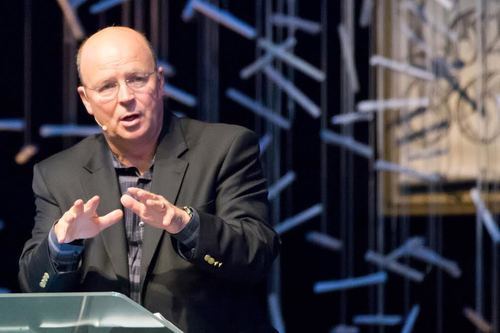
There are few modern-day biblical scholars who have influenced me more than Scot McKnight. His Jesus Creed blog was one of the first I followed religiously, and books like The Blue Parakeet, The King Jesus Gospel, and A Community Called Atonement remain among some of my most recommended. A professor of New Testament at Northern Seminary in Lombard, Illinois, Scot is a world-renowned scholar, writer, and speaker. He is the author or editor of fifty books and he writes and curates of one of the most popular evangelical blogs on the Internet.
On a personal note, Scot has gone out of his way to encourage and help me as a writer and Christ-follower, often including me in theological conversations that many other credentialed theologians might think me unqualified to join. The man's also got a great, quirky sense of humor.
Scot’s newest book, Kingdom Conspiracy: Returning to the Radical Mission of the Local Church is already making waves, and in light of that, I’ve invited Scot to be a guest for our ongoing “Ask a…” series.
You know the drill. If you have a question for Scot, leave it in the comment section. (Note: We’re only considering questions from the comment section here on the blog, not from Facebook or Twitter.) At the end of the day, I’ll choose 6-7 of the most popular or interesting questions to send to Scot for response. Be sure to take advantage of the “like” feature so we can get a sense of which questions are of most interest to readers. Look for Scot’s responses next week.
Ask away!



November 12, 2014
“You’re Not Crazy, and You’re Not Alone”
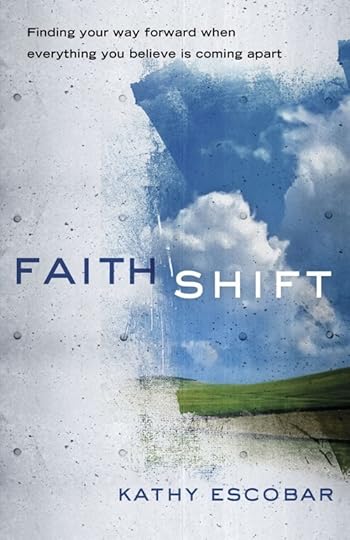
So begins Chapter 1 of Kathy Escobar’s fantastic new book, Faith Shift: Finding Your Way Forward When Everything You Believe is Falling Apart. From those first few pages to the very last, I found myself nodding along, scribbling in the margins, breathing 'amens', and thinking to myself, now THIS is the book I wish I’d had ten years ago, THIS is the book I’ll be recommending to family, friends, and readers experiencing crises of faith.
It’s been a magnificent fall for book releases, and I know I’ve been recommending a lot these days (sorry!), but for those of you who resonated with Faith Unraveled (formerly titled Evolving in Monkey Town), Faith Shift is a must-read. While there are plenty of spiritual memoirs that describe what it’s like for a person of faith to enter a time of deep questioning, and plenty of theological books designed to address those questions, Faith Shift is unique in that it offers practical, pastoral advice for managing the emotional, relational, and spiritual fallout from those questions.
Nearly every time I do a Q&A time after a presentation, someone in the audience asks how my changing faith has affected my relationships with my family and friends. Often, there are tears in the person’s eyes, and I know I’ve found a fellow traveller, a sister sojourner traversing the dark and difficult road of doubt. The fact is, when your community, identity, and sense of purpose and security are all tightly intertwined with your faith, challenges and changes to that faith can wreak havoc on your relationships and spiritual and emotional health. And unfortunately, for many, the people they most want to turn to for support and guidance—pastors, friends, even spouses and family—at best simply don’t understand their experiences and at worst condemn them as sinful.
This is why Kathy Escobar is the perfect person to write this book. Not only has she gone through a faith shift of her own, she has years of experience counseling people who find themselves in some sort of spiritual wilderness. So in addition to including Kathy’s own story, Faith Shift is packed with resources, prayers, ideas, conversation-starters, questions for personal reflection, and exercises. The appendix includes an incredibly helpful guide for talking about faith shifts with friends and family and even provides suggestions for “how to be a good friend to someone in a faith shift” that you may want to photocopy and mail to that aunt who has been sending you Christian apologetics books every week since she found out you were questioning young earth creationism.
For these reasons and more, I highly recommend this book not only for people experiencing a crisis of faith but for people who love and care for someone experiencing a crisis of faith and don’t know how to respond. Pastors too would benefit immensely from a quick read-through.
Now, this is not a book for skeptics looking for answers, or for those interested in seriously exploring atheism. From the get-go, Kathy assumes that her readers are interested in holding on to some remnant of their faith even as their beliefs dramatically change. If you do not share that presupposition, the book could be frustrating at times.
But for all the people who come up to me at book signings with tears streaming down their faces because they feel so isolated in their journey through questions and doubt, I am thrilled that I can say with more confidence, “you’re not crazy, and you’re not alone, and you’re going to love this book…”
***
Note: While I received a complimentary copy of this book from the publisher, I am not paid for reviews.



November 7, 2014
Work of the People Video: The risk of following Jesus
I had such a good time working with Travis Reed from Work of the People on a series of videos about faith, doubt, the sacraments, and church. The video above is the first of many in the series. Be sure to follow Work of the People for more and for other interviews with Barbara Brown Taylor, Richard Rohr, Brene Brown, etc.



November 5, 2014
God and the Gay Christian’ Discussion, Week 6 & Conclusion
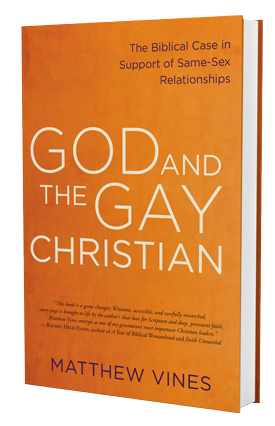
Over the past few weeks, on Wednesdays, we have been discussing Matthew Vines’ book, God and the Gay Christian: The Biblical Case in Support of Same-Sex Relationships. (See Part 1, Part 2, Part 3, Part 4, Part 5) I chose this particular book because I think it provides the most accessible and personal introduction to the biblical and historical arguments in support of same-sex relationships, and because Matthew is a theologically conservative Christian who affirms the authority of Scripture and who is also gay. His research is sound and his story compelling, and he’s a friend—someone I like and respect and enjoy learning from.
This week we wrap up our discussion with a look at Matthew’s argument in support of marriage equality in Chapter 8 and his concluding remarks in Chapters 9 and 10.
The Biblical Argument for Marriage EqualityIn Chapter 8, Matthew tackles a big question: can same-sex marriage fit a Christian basis for marriage?
“Our question is not whether the Bible addresses the modern concepts of sexual orientation and same-sex marriage,” he writes. “We know it doesn’t. Instead, our question is: can we translate basic biblical principles about marriage to this new situation without losing something essential in the process?”
That’s a complicated question for a lot of reasons, not the least of which is the reality that Christians themselves disagree on exactly what constitutes “biblical principles about marriage”! I know plenty of people who would describe my marriage with Dan as “unbiblical” because it functions as a partnership rather than a hierarchy, with our roles determined by gifting rather than gender. So we’re wading into tricky territory here, but Matthew handles it gracefully.
He begins with Ephesians 5, where the apostle Paul describes marriage as a “profound mystery” pointing to the ultimate union between Christ and the Church. “In marriage,” writes Matthew, “we are called to reflect God’s love for us through our self-giving love for our spouse.” This is something same-sex couples can do just as well as heterosexual couples, he says. Matthew then goes on to address three common objections to same-sex marriage: procreation, gender hierarchy, and gender complementarity.
Procreation
One of the most common reasons for opposing same-sex marriage cited by non-affirming Christians is that only a man and woman can biologically procreate. Appealing to Genesis 1:28 as a direct command rather than a creative blessing, they argue that the capacity to procreate is critical to a God-honoring union.
While much of Hebrew Scripture focuses on God’s covenantal blessing to Israel through biological procreation, “the life, death, and resurrection of Jesus ushered in a host of transformative changes,” writes Matthew. “And one of the change is vital to our conversation: Biological procreation no longer determines membership in God’s Kingdom. Spiritual re-birth through faith in Christ does.”
To support this, Matthew points to Jesus’ conversation with Nicodemus in John 3, as well as his statement in Matthew 12:46-50 that “whoever does the will of my Father in heaven is my brother and sister and mother.” This new emphasis on being “grafted in” to the family of God brought those who had traditionally been left out—eunuchs, for example—in. Furthermore, despite the significance of procreation in the Old Testament, Matthew argues, infertile marriages were not considered illegitimate. Take Abraham and Sarah, for example, or Elkanah and Hannah. Song of Songs beautifully celebrates the joys of erotic love for their own pleasurable merits, not simply for the purpose of procreation. And neither Jesus nor the apostle Paul suggest that non-procreative marriages are illegitimate or that procreation is the only purpose of sex. “From a theological perspective,” Matthew concludes, “marriage primarily involves a covenant-keeping relationship of mutual self-giving that reflects God’s love for us….Marriage is only secondarily—and not necessarily at all—about having biological children.”
Gender Hierarchy
This, in my opinion, is the big one. Because some Christians interpret the New Testament household codes as prescribing hierarchal gender roles wherein wives function as subordinates to their husbands, their challenge to same-sex couples is, who’s in charge?
We discuss the New Testament Household Codes here, and at length in our series on the subject, here, but in summary: Just as the New Testament household codes assume a hierarchy between master and slave, they assume a hierarchy between men and women. It would be silly to expect anything else to emerge out of writings from the Greco-Roman culture. What makes the New Testament household codes powerful and countercultural is that they actually challenge those hierarchies by instructing all members of the household—even the masters, who in that culture held unilateral authority over their slaves, wives, and children— to imitate Jesus Christ in their relationships by modeling his self-sacrificing love.
Matthew points out that in his letter to the Galatians, Paul wrote that three types of hierarchies would fade away in Christ. One was that of male and female. The others were distinctions between Jew and Gentile and distinctions between slave and free. “In opposing slavery,” writes Matthew, “Christians in the 19th century took that message to heart. Since there will not be a distinction in God’s kingdom of slave and free, Christians decided to abolish the inhumane institution of slavery in the West….Christians did not work for change so that slaves would be regarded as having equal value while maintaining a subordinate status and role in society. They chose to abolish the subordinate status altogether.”
And yet many today continue to argue that Galatians 3:28 only refers to salvific status when it comes to women, that Paul is simply granting women access to salvation, not equal status with men. (This doesn’t make much sense since women were already regarded as having access to salvation.) But if this thinking were applied to slaves, who are mentioned in the very same verse, then Christians could not appeal to Galatians 3:28 for the abolition of slavery. In other words, “neither slave nor free, Jew nor Greek, male nor female” has to mean something more than shared access to salvation. It has to mean something radical about how relationships among Christians in this patriarchal culture were to change.
I’ve said it once, and I’ll say it a million times more: What makes a marriage holy and sacred isn’t the degree to which it reflects a rigid hierarchy, but rather the degree to which it reflects the self-giving, self-sacrificing love of Jesus. It’s not about putting Jesus at the top of a flowchart, with the man next in line, and the woman at the bottom. It’s about putting Christ at the center. That, I believe, is the truly radical message of the New Testament Household Codes that so often gets drowned out by advocates of Christian patriarchy. And I see no reason why the self-sacrificing love of Jesus cannot be modeled in a committed same-sex relationship as well as it can be modeled in a committed heterosexual relationship. (After all, if anatomical complementarity alone were what sanctified a marriage, then an abusive heterosexual marriage would be considered more “sanctified” than a loving homosexual one.)
[For more on the New Testament, check out our "Submit One To Another" series.]
Anatomical Complementarity
A final argument against same-sex marriage is that two people cannot become “one flesh” if they do exhibit anatomical complementarity. Here Matthew cites Jim Brownson’s Bible, Gender Sexuality, where the Bible scholar argues that such an interpretation of Genesis 2:24 over-sexualizes the phrase “one flesh,” which in the Bible is used metaphorically to describe ties of kinship between all sorts of people. (In Genesis 29, Laban describes his son-in-law Jacob as “my bone and my flesh,” for example.) “Becoming ‘one flesh,’” Matthew argues, “encompasses much more than the act of sex. It includes the entire covenantal context in which God intends for sex to take place.”
In Ephesians 5:31-32, the phrase “one flesh” is said to be a mystery of marriage that relates to Christ and the Church. "Not only does Ephesians 5 never mention gender-determined anatomical differences, it focuses instead on the fact that husbands and wives are part of the same body…So according to Ephesians, gender difference is not necessary to become one flesh in the Bible’s understanding of those words.”
Matthew concludes this chapter with a stirring call: “In God’s glorious, limitless love, he has imparted to us that most precious and humbling of gifts: our own capacity for love. Not all Christians are called to marriage, and the church must uphold the validity of celibacy for those who are called to it. But for those who do not sense a calling to celibacy, God’s gift of sexual love in marriage should be affirmed. There is no biblical reason to exclude the covenantal bonds of gay Christians from that affirmation.”
I suspect that as marriage equality continues to spread across the country, the Church’s conversation around LGBT inclusion will change. Will churches that oppose same-sex marriage encourage married couples to divorce? Will they turn away gay or lesbian couples when they bring their kids to Sunday school? Will they deny that Christ-imitating, self-sacrificing love is indeed present in many same-sex relationship and continue to advocate against ensuring gay couples can visit one another in the hospital? God has this strange habit of using “outsiders” to school the “insiders” on what it really means to love and serve. I suspect it will be no different in this case.
The Image of God and LGBT ChristiansIn Chapter 9, Matthew makes a strong case that being created in the image of God cannot uniquely be tied to heterosexuality and points to the Trinity to show that part of being created in the image of God is longing for intimacy and relationship. It’s too much to reiterate in the limited space we have left, so I urge you to pick up God and the Gay Christian for the full argument. I would simply add that, having had a conversation just yesterday with someone who is intersex, it is time we accept the reality God has not created a rigid, one-dimensional world when it comes to gender and sexuality. As someone put it the other day: Acknowledging the existence of twilight doesn’t require rejecting the existence of day and night.
Matthew addresses the incredible damage done by Christians who teach LGBT people to hate their sexuality, which cannot so easily be separated from their very selves. “When we tell people that their every desire for intimate, sexual bonding is shameful and disordered,” he writes, “we encourage them to hate a core part of who they are. And when we reject the desires of gay Christians to express their sexuality within a lifelong covenant, we separate them from our covenantal God, and we tarnish their ability to bear his image.”
Then Matthew concludes with this little truth bomb: “Instead of asking whether it’s acceptable for the church to deny gay Christians the possibility of sexual fulfillment in marriage, we should ask a different question. Is it acceptable to deny gay Christians the opportunity to sanctify their sexual desires through a God-reflecting covenant.”
Questions for Discussion:1. Are there same-sex couples in your life whose relationships reflects the self-giving love of Jesus? Tell us about that.
2. As more states embrace marriage equality and civil rights for LGBT people, how do you think the conversation regarding their inclusion in the church will change?
3. Finally, as we conclude this series, do you have any lingering questions, thoughts or ideas you would like to discuss? Has this conversation changed anything for you, and what would you like to see happen moving forward—both on the blog and in the wider Church?
***
Finally: I'd like to issue a big thank-you to our friend, Matthew Vines, who not only wrote a great book for discussion, but who has jumped into the comment section several times to respond to your questions and ideas. I've gotten to know Matthew a little better over the course of the last few weeks and I have to say, his guy's stubborn sense of hope, joy, and commitment to Jesus continues to inspire and challenge me. Let's be in prayer for his efforts at The Reformation Project's Regional Training Conference this week.
Comment section will stay open for 24 hours.



November 4, 2014
See you in Ohio, Georgia, & Alabama….
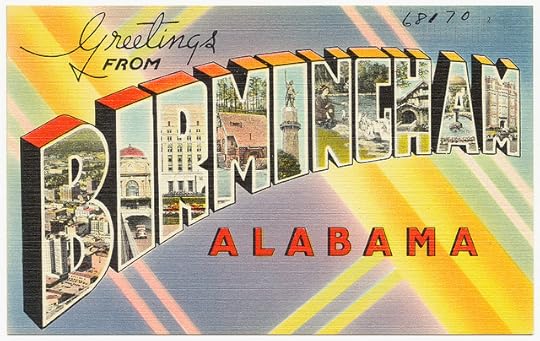
© 2011 Boston Public Library, Flickr | CC-BY | via Wylio
I’ve been enjoying my travels significantly more this season, having scaled back a bit. Stewarding my time in this way has helped me feel more present and engaged with each group, and I’m so grateful for every opportunity I get to have real, in-the-flesh conversations with readers. My last three trips of the season will take me to Ohio Wesleyan University, Camp Glisson in Dahlonega, Georgia, and the great city of Birmingham, Alabama—my old “stomping ground.” Here are the details, if you’re interested in joining us:
Friday, November 7
Ohio Wesleyan University Love Across the Spectrum Event
Delaware, Ohio
7 p.m. - “My Year of Biblical Womanhood”
FREE & Open to Public
More Info
Friday, November 14 – Saturday, November 15
Young Adult Retreat hosted by North Georgia UMC
Glisson Camp and Retreat Center, Dahlonega, Georgia
All weekend - “Keep the Church Weird” (material from the new book!)
One-day rate available
More Info
Sunday, November 16
Canterbury United Methodist Church
Birmingham, Alabama
Sunday School hour: “My Year of Biblical Womanhood”
6 p.m. - “Keep the Church Weird” (material from the new book!)
FREE & Open to the Public
More Info
Let me know if I’ll see you there!



November 2, 2014
Sunday Superlatives 11/2/14

© 2010 joiseyshowaa, Flickr | CC-BY-SA | via WylioAround the Blogosphere...
Wisest:
Efrem Smith with “The Privileged and The Poor”
“To dismantle poverty in this way, we not only need multi-ethnic congregations, we need multi-class congregations. Poor people ought to have a voice in the Church. They ought to have the opportunity to serve as elders, deacons, preachers, and board members alongside the Privileged. Putting all Privileged People in power and places of influence may be the American way, but it’s not the Kingdom of God way.”
Bravest:
Micha Boyett with “Deacons and Elders and Me”
“This is not a story of rebellion. This is not the story of a girl who moved two thousand miles away and learned to take scripture less seriously. This is the story of how my love for scripture deepened and grew more technicolored, beautiful. This is the story of finding myself in a church where I was invited to use my gifts in order to love God faithfully. I will kneel before my church on Sunday in holy trembling, because of the men who led me as a child, because of the women who led me without titles. I will commit my weak-willed soul to the leadership of my church because of the deacons and their wives who gave me courage to travel all the way to these vows. On Sunday I will be ordained.”
Boldest:
Austin Channing Brown with “Bring Yourself”
“I believe in the legacy of black women who refused to be satisfied with lies. I believe that I am fearfully and wonderfully made. I believe that I am created in the image of the Divine. I believe that I am at my best when I bring my wholeness to the table. I believe that the weight of racism and patriarchy can’t drown me. I believe that I am made for resistance, for freedom, for community.”
Truest:
Jason Micheli at Jesus Creed with “If you can’t say it about Jesus, don’t say it about God”
"We can’t say or think or act like God hates ‘sinners’ because we know Jesus didn’t. We can’t say or think or act like God doesn’t care about the poor because we know Jesus did. We can’t say or think or act as if God is against our enemies because we know Jesus loved them. We can’t scratch our heads and wonder if we need to forgive that person in our lives because know what Jesus said about it."
Coolest:
Guerilla Mosaic Artist Now Filling Chicago Potholes with Flowers
Most Eye-Opening:
We’ve taken to listening to NPR’s “On the Media” on the 45-minute drive to church on Sundays, and this week’s episode—particularly the reports on money in politics and “The Unseen World of Content Moderation”—certainly reinforced my conviction that sin is real (just in time for confession). Though some parts were kind of a downer, this episode is worth a listen.
Most Challenging:
Tanya Marlow with Larry Largent with “When We Doubt: The Wilderness Between Our Mountaintop Experiences”
“Our churches would do well to consider Elijah as they interact with those who are brave enough to give voice to their own dark nights of the soul. Not the Elijah on Carmel or Sinai, but the Elijah that was once alone in the Negev wilderness.”
Best Reflection(s)
Everything Richard Beck says about Halloween, Death, and All Saints
Best Point:
Caryn Rivadeneira with “School Prayer Doesn’t Need a Comeback”
“I object to any mission to bring prayer “back” to school because I can’t support the faulty theology—downright heresy—of implying God is only around to hear our prayers when the building sanctions his presence. Prayer never left schools. And God never did either. To suggest otherwise should make us shudder. And yet, that’s what campaigns full of good God-fearing folks seem to be saying.”
[Reminds me of one of my first posts to ever go ‘viral’—“God Can’t Be Kept Out.”]
On Facebook…We have a really great conversation happening on Facebook this week regarding the reality of sin and the use of the word ‘broken.’ I have a feeling this will generate several posts. Feel free to weigh in.
***
So, what caught your eye online this week? What's happening on your blog?



November 1, 2014
Learning from LGBT Christians: 2 Upcoming Events (& a giveaway!)
This week I heard from a multitude of friends and readers who expressed frustration regarding Christian conferences that tend to speak about LGBT people as if they were an issue, removed from the Church, rather than speak with LGBT people who are in fact a part of the Church. As important as it is to speak up about that negative trend, I think it’s even more important to support, encourage, and participate in the alternatives—gatherings led by LGBT Christians, two of which are currently registering participants.
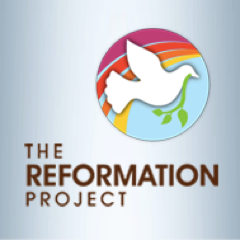
The first, The Reformation Project’s Regional Training Conference, happens next week in Washington, D.C. Led by friend-of-the-blog and author of God and the Gay Christian Matthew Vines, the purpose of this event is twofold: 1) to provide training and resources on how to talk about the Bible and LGBT issues with non-LGBT-affirming Christians, and 2) to connect LGBT-affirming Christians with like-minded people for support and dialog.
The speaker lineup this year is truly outstanding and one of the most diverse you’ll see in the Christian conference scene all year, featuring Gene Robinson, David Gushee, Danny Cortez, Rachel Murr, Oneida Chi, Bishop Yvette Flunder, Justin Lee, and more than 20 more. To learn more about the spirit and purpose of this event, check out AnaYelsi Sanchez’s piece, “Amidst Reformation: Our Chance to Change the Church” at Believe Out Loud.

The second event—the annual Gay Christian Network Conference scheduled for January 8-11 in Portland—looks to be the largest since its inception with so many participants expected this year (more than 1300) they’ve had to move venues!
I attended last year’s event, and I’m not exaggerating when I say it was absolutely life-changing for me. (See my post about it.) I’ve never attended a Christian conference so energized by the Spirit, so devoid of empty showmanship or preoccupation with image, so grounded in love and abounding in grace. I dedicate quite a bit of space in my new book to describing what it was like to practice confession, communion, worship, and healing with these brothers and sisters. I came as an ally, but I left as a sister.
With attendees from all over the world (12 countries and more than 40 states so far), the annual GCN conference is a gathering place for people to celebrate both their uniqueness and their unity. This year, hundreds of LGBT Christians, family members, friends, ministers, and more will come together in Portland for the singular purpose of transforming how we engage with both Side A Christians ( who support same-sex relationships/marriage) and B Christians (who pursue or encourage celibacy) across the church aisle.
I’m partnering today with GCN to give away two tickets to the Portland event. In order to be entered for a chance to win, just share this post on Twitter or Facebook with the #GCNconf hashtag between November 1 and November 8 (but make sure your post is public, or the GCN folks won’t see it). A GCN representative will contact you if you’ve won.
Gay, lesbian, bisexual and transgender Christians are not outsiders or enemies of the Church. They are the Church. And they are leading Her to a more hopeful, inclusive, and gospel-centered future. Will you join me and follow their lead?



October 30, 2014
The Slaveowners and Me: On Nurturing Empathy for Oppressors
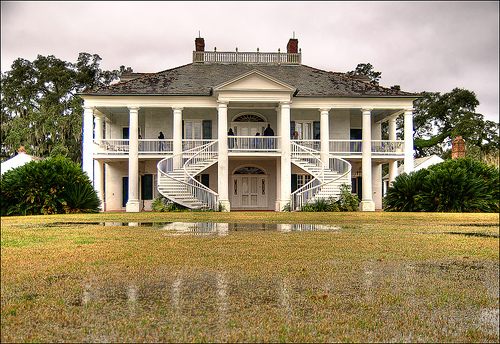
© 2008 Corey Balazowich, Flickr | CC-BY-ND | via Wylio
I was baptized in Alabama, at a Bible-believing church less than 12 miles and 30 years away from where four little girls—Addie Mae Collins, Cynthia Wesley, Carole Robertson, and Denise McNair—were killed in a church bombing during the Civil Rights movement. I knew the starched white columns of old plantation homes just as well as I knew the spires of Cinderella’s storybook castle, and I’d seen with my own eyes how, just before a harvest, Georgia’s cotton fields could look like a fresh-fallen snow.
My ancestors were not slave owners, but they fought a war to protect their neighbors who were. I learned the n-word from my great-grandmother, a sweet, churchgoing lady who loved Jesus and read her Bible and, in the remote mountains of Appalachia, regarded the black man we saw at the ice cream shop that day as a fearful curiosity.
When I was a teenager, my family moved to Dayton, Tennessee, a town famous for prosecuting and convicting a science professor for teaching evolution in 1925, and which sits right on the path of the old Trail of Tears. I took a German reporter through the Scopes Trial museum a few weeks ago, where she paused at the tiny glass case in the back dedicated to Cherokee memorabilia and said, “In Germany, they do not let us forget. Reminders of the Holocaust are everywhere, not just our museums.”
An insatiable reader, I grew up reading Southern writers: Mark Twain, Eudora Welty, Zora Neale Hurston, Harper Lee, William Faulker, Walker Percy, Flannery O’Conner. In addition, my mother brought home armfuls of historical fiction novels from garage sales and let me stay up long past my bedtime so I could see what happened next on the Oregon Trail, at the Alamo, at Sand Creek. In the midst of all this reading, I learned not only to empathize with the suffering and the oppressed, but also to empathize with the oppressors, who - let's face it - often shared my skin tone, my geography, my language, and my faith.
In short, I didn’t learn about America’s history of oppression from the Church. I learned it from Huck Finn. My church, like so many, focused on sins of the present, not sins of the past.
I was thinking about this recently after our conversation on Monday about corporate confession and lament and after this week’s controversial conference on homosexuality hosted by the Ethics & Religious Liberty Foundation of the Southern Baptist Convention. Given the SBC’s troubling history of supporting slavery and opposing civil rights for African Americans, I was dismayed to see a Southern Baptist attendee brag about the event’s good attendance by posting a picture of a crowded conference room with the caption: “This is what the ‘wrong side of history’ looks like. ☺” Later in the event, a speaker declared he would “rather be on the wrong side of history than on the wrong side of a holy God.”
While comparing the suffering of slaves and people of color to the marginalization of LGBT people is irresponsible and does a disservice to both, I am often surprised by Christians’ complete lack of interest in exploring exactly why their predecessors might have supported oppression in the past. It seems like such information might be critical for assessing whether similar oppression is occurring in the present. Yes, the SBC formally apologized for its racist origins in 1995, but I wonder how many Southern Baptists have taken the time to really study the sermons and speeches of their predecessors to learn what rhetorical devices and hermeneutical approaches were employed to make so many Christian people so comfortable with that oppression that they formed an entire denomination around it.
The fact is, most of the defenses of American slavery were written by clergy who quoted Scripture generously and appealed to a “clear, plain, and common-sense reading” of biblical passages like Genesis 17:2, Deuteronomy 20:10-11, 1 Corinthians 7:21, Ephesians 6:1-5, Colossians 3:18-25; 4:1, and I Timothy 6:1-2. Many Bible-believing Christians, including those who were uncomfortable with slavery and encouraged masters to treat their slaves with “Christian kindness,”just weren’t buying the abolitionist argument that placed the “spirit of the law” over the “letter of the law." As Connecticut Congregationalist Leonard Bacon put it, “The evidence that there were both slaves and masters of slaves in churches founded and directed by the apostles, cannot be got rid of without resorting to methods of interpretation that will get rid of everything.” [For more on this, check out my post about Mark Noll’s excellent and illuminating book, The Civil War as a Theological Crisis.]
When I raised this point on Twitter (not the best place to raise it, I realize), my remarks were met with incredulity:
How dare you bring up past sins that are totally unrelated to the present issue!
Southern slave-owners were just racist and greedy people who purposefully abused Scripture to their own ends!
Christians were on the abolitionist side, not the pro-slavery side!
These responses reveal a lack of empathy—not so much for those who have been oppressed, but for the good intentions and misguided complacency of the oppressors.
The truth is, there were Christians on both sides of the American slavery debate. It's an uncomfortable reality, but whether we describe people as submitting to the Bible or as using the Bible depends largely on hindsight. I have no doubt that many of the people who opposed abolition, interracial marriage, protection of indigenous people, black civil rights, women’s suffrage, etc. believed wholeheartedly that God was on their side and they were simply being faithful to God’s Word. While blatant hate and racism certainly motivated plenty of our country’s past oppressors, blatant hate and racism aren't nearly as effective at sustaining oppressive systems as uncritical acceptance of the way things are.
In this sense, the question, what were they thinking? need not be a rhetorical one. Rather, it’s a crucial one. As we read and explore and study our history, white Christians in particular would do well to ask of our grandparents, great-grandparents, and great-great grandparents: What were they thinking? How did they justify their actions? What convinced them that they were doing right? Whether our ancestors were complicit in oppression or whether they bravely stood up against it, it’s worth nurturing the curiosity and introspection it takes to wonder why.
And lest you think this post is about finger-pointing, I have no doubt in my mind that if my own assumptions and prejudices go totally unchecked, if I never stop for a moment to consider the other side and wonder if I might be wrong, I too am capable of using the Bible to my own ends, of convincing myself that God is on my side.
We are often told to nurture empathy for those who are unlike us or those who suffer. But Scripture’s powerful emphasis on prophetic lament calls us to also nurture empathy for those we’d like to think are unlike us, those whose sins we assume we would never commit ourselves. Because the degree to which we take sin seriously isn’t so much in how good were are at spotting it in others, but rather in how good were are at spotting it in ourselves. And sometimes that means combing through our shared history and flinching a little at how quickly those dusty pages can transform into mirrors.



October 27, 2014
“Forgive Us”: Christians, Injustice & Corporate Confession
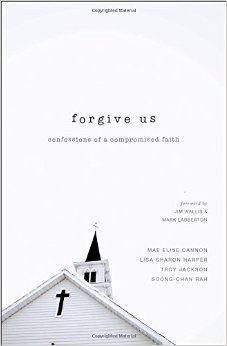
Author and activist Bryan Stevenson was recently interviewed on The Daily Show, and in his conversation with Jon Stewart, noted that Americans often have a difficult time acknowledging and confessing those corporate injustices—like racism— that are a part of our shared history and a part of our present-day culture. As I watched, I found myself thinking about how the Church, with the age-old sacrament of confession and the tradition of corporate lament, is equipped to speak powerfully and counter-culturally to this very issue. So why have so many of our congregations allowed the practice of corporate confession fall by the wayside?
Perhaps it is because many of us struggle to find words adequate to lament those sins committed against indigenous people, African Americans, immigrants, women, and other marginalized groups throughout American history. This is why the book, Forgive Us: Confessions of a Compromised Faith is so powerful and so practical. In Forgive Us, authors Soong-Chan Rah, Mae Elise Cannon, Lisa Sharon Harper, and Troy Jackson provide historical information, reflection, and prayers around Christianity’s complicity in sins against God’s creation, indigenous people, African Americans and people of color, women, the LGBTQ community, immigrants, Jews and Muslims.
This has been an amazing fall for book releases, and Forgive Us was one of my favorites, which is why I’m so thrilled to welcome all four authors to the blog today to talk about corporate confession and its role in the American Church today.
RHE: Throughout the book, you make a point of identifying yourselves as evangelical Christians. Why was that important to you?

Soong-Chan: A few months ago I got a phone call from a national newspaper for an interview about diversity in evangelicalism. Out of curiosity, I inquired about the reporter's background and she stated that she had no religious background but that she was originally a political reporter who was assigned the "evangelical" beat because of her background in politics. Unfortunately, in recent years, evangelicalism has become defined as a purely political movement. I think we are hoping to restore some of the theological identification of evangelicalism. That's why we state at the beginning of the book, our commitment to a high view of Scripture and to a high view of Jesus, which has historically been key markers for evangelical faith. I think more people would identify with this theological definition over and against the political definition that has come to identify evangelicalism in the United States.
From another angle, I personally do not want to abandon the term because it shows a greater sense of responsibility for the sins of evangelical Christian faith. I was at a Native American Theology conference when one of the white participants stated that we should abandon terms like evangelical and Christian. A Native American theologian replied that abandoning those terms would also be a shirking of responsibility that comes with the history of those names. In other words, abandoning those terms by those who have historically perpetuated those terms would be the opposite of what we are calling for in this book. Which is the acknowledgement of historical sin and the seeking of forgiveness that leads to a restored and redeemed faith community.
In the Introduction to “Forgive Us,” you show that throughout Scripture lament and confession are corporate acts. And yet much of Christian culture regards sin and confession as individual concerns. In what sense is corporate confession countercultural? (Say that three times fast!)
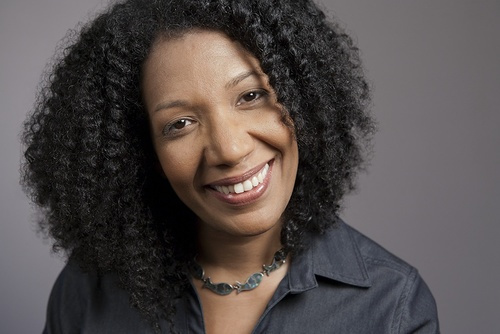
Lisa: In our hyper-individualized society we have lost the sense of being connected to much more than our own individual identity, desires, choices, and brokenness. Our society elevates the self and fails to acknowledge the reality of human sin. But this was not the world of the Hebrews.
The Hebrew people were a communal and indigenous culture. Individuals’ core identities were interwoven with the generations that came before, their extended families, their community, and the land where they and their ancestors lived. We see Nehemiah stand in the gap confessing the sins his people as his own, though he never lived in Jerusalem and had nothing to do with the tangible cause of the burning of Jerusalem’s walls. In Lamentations 3, we see Jeremiah offer a lament and confess the sins of his community though he repeatedly did what was right before God. Corporate confession was a critical practice; exercised most often when the culture and governance of a society denigrated the image of God in their midst by disregarding the orphan, the widow, the immigrant, or the poor.
The call of the Kingdom of God is always counter-cultural. Jesus says, “…the kingdom of God has come near, repent, and believe the good news.” (Mark 1: 15b) Paul warns us: “Do not be conformed to this world, but be transformed by the renewing of your minds, so that you may discern what is the will of God—what is good and acceptable and perfect.” (Romans 12: 2a)
Corporate confession is counter-cultural in our society because the hyper-individualistic, self-worshipping nature of our culture is counter to God—ultimately, it leads us to disregard and even crush the image of God in marginalized and impoverished peoples. This is the first place where we need to be transformed by the renewal of our minds. We need God to take our blinders off—to help us see how we are all connected—to help us see the image of God in “the other”—to help us stand in the gap like Nehemiah and Jeremiah—to own the reality that the forbearers of our Christian American faith were not transformed in these respects and the consequences still live with us. The walls are down and the gates have been burned by fire, per-say, and like in Nehemiah’s day, we need to confess the sins of our people so that our land can be healed.
How do you respond to those who would argue that many of the sins you describe in this book were committed by others—in some cases long ago—and therefore none of our concern?

Mae: Sin, brokenness, and separation from God’s perfection are realities not only for us as individuals but for our communities as well. It is imperative that we not only acknowledge our individual sins, but also that we realize and accept ways we benefit from unjust systems and corporate brokenness. Slavery is a good example. Many whites in the United States today may claim that slavery is a “historic sin” and is irrelevant today. People might claim we shouldn’t repent of the sin of slavery because, for recent immigrants, our ancestors didn’t own slaves. Yet, systems and infrastructures continue to exist today which were built on the injustices of slavery. After reconstruction and until passage of the 1965 voting rights act white families and communities were able to build up capital and privilege while black Americans lived under the mantle of Jim Crow voting and segregation laws in the south, and red-lining and workplace segregation in the north. These privileges and racial assumptions continue to exist in our society today. It is imperative that the church acknowledge the ways we have benefited from these unjust systems. We must repent of both individual and corporate sins where we have been complicit and have inherited privilege.
Why is acknowledgment of sin so important to true reconciliation?

Troy: This book began as a response to a section in Blue Like Jazz by Donald Miller when he described setting up a confessional booth at a raucous annual festival at Reed College in Portland. Instead of inviting confessions, Christians confessed the historic sins of the church to those who came to the booth.
As an historian, it struck me that this should and could be an important posture that the church should assume when engaging the world. We should adopt a confessional stance, acknowledging the many ways the church has failed God and humanity. The trouble is, we have a very surface level view of the sins of the American Church. We might be able to talk about racism or sexism in a generic way, but not with much specificity. I quickly realized that an anemic understanding of sin leads to anemic confessions, robbing them of the power to transform the confessor and those hearing the confession.
So at University Christian Church in Cincinnati, Ohio, we launched a six-week sermon series in the Spring of 2007 called “The Confessions of the Church.” Each week, I shared some of the tragic history of the church in how we have sinned against African Americans, Immigrants, Women, and the LGBTQ community. These sermons sparked a lot of introspection and lively confession and repentance within the lives of congregational members.
When it comes to people who have been historically mistreated, abused, and sinned against, any attempt at whole relationship that skips this step of honest understanding of history and heartfelt confession will be little more than assimilation. This has all-too-often been the approach of the white church toward African Americans: we are somewhat sorry you’ve endured so much, but now you are welcome to join our church if you would like. This is not reconciliation for it fails to honor African American culture and to account for centuries of wounds and abuse.
The chapter on sins against indigenous people really moved me. Tell us a little about how, in response to dialog with indigenous theologians and activists, InterVarsity made policies to submit to the spiritual authority of original peoples regarding the land. (I thought that was a nice example of prayerful listening leading to action.)
Lisa: It wasn’t so much policy changes, as it was conscious decisions on the parts of leaders of the time to submit themselves to the authority of the first peoples of their regions when making decisions about where their regional and national conferences were to be held. For example, I directed a racial healing conference in Greater Los Angeles called “One God, Many Nations” in 2004. Richard Twiss (Lakota author of One Church, Many Tribes) was a new mentor in my life at the time. He agreed to serve as our keynote speaker, but strongly advised us to seek the blessings of first people of the Los Angeles area where the conference would take place. I did.
I called the office of the Gabrielino/Tongva Tribe of Los Angeles and spoke with a member of the tribal council. She didn’t understand my request, at first. I explained that I was a staff member of Intervarsity Christian Fellowship in Los Angeles. We had come to recognize the spiritual authority that Creator God gave to all the first peoples of the land to serve as stewards and protectors of their appointed lands. We understand that the Tongva were the first peoples of Los Angeles. We would like to hold a racial healing conference on the land, but we understand the process is as important as the content of our gathering. In recognition of the spiritual authority of the Tongva people, we ask for the tribe’s blessing over our gathering. If granted, we would like to open our gathering with a traditional protocol ceremony. The tribal council member took my message to the council. Days later, she contacted me to let me know the people were moved by our humility and agreed to offer their blessing. The Chair of the Tongva council board attended our gathering. The Divisional Director of Intervarsity – Greater Los Angeles and I gifted the leader with a Pendelton blanket and sage. The Tongva chair offered his blessings over our gathering.
I continued to contact the Tongva council chair to ask for the council’s blessing for each large conference we convened until the chair said, “Lisa, you have shown yourself to be worthy of our blessing. We bless you to do whatever you would like to do in our land.”
The research that went into this project is impressive, and Forgive Us serves as an eye-opening introduction to the ways in which the Church supported exploitation, marginalization, and even ethnic cleansing throughout America’s history. How did notion of “Manifest Destiny” in particular wreak havoc on creation and indigenous people?
Mae: Manifest Destiny became a commonly held ideology in the early 19th century and was the belief that the United States had a God-given right to aggressively spread values of white civilization across the land mass of the North American continent from the Atlantic to the Pacific Ocean. It wreaked havoc on creation and entire communities of indigenous Americans including the Five Civilized Tribes, who were forcibly removed or annihilated based on the assumption that they were an impediment to God’s purposes being realized. Manifest Destiny justified the conquering of the indigenous peoples of Texas, New Mexico, California, and other parts of the Southwest; and the inclusion of the Oregon territory in the United States. Christians must confess the many ways we have contributed to this tragic history by acknowledging and repenting of our sins. We need to repent of our attitudes about the divine right of conquest, white supremacy, ethnic superiority, Manifest Destiny, the pursuit of wealth, and the brutalization, domination, and murder of thousands of Native people who have lived before us.
In addition to featuring sins against creation, indigenous people, African Americans and people of color, women, immigrants, and Jews and Muslims, you featured sins against the LGBTQ community. Was this a controversial decision? Why did you decide to include sins against gay, lesbian, bisexual, and transgender people in the book?
Troy: When David Kinnaman and Gabe Lyons shared their findings of how unchurched young people view the church in Unchristian, one of the most jarring critiques was that the church is, in their words, anti-homosexual. For us to engage the church and the culture in a relevant way, we simply could not avoid engaging the last forty years of hatred toward the LGBTQ community that for far too many has defined the church.
The decision to include this chapter was not controversial for the authors. We all agreed that we simply could not write this book and not address this horrible track record. That said, this was a risky chapter to include in the book for Zondervan, and we are very pleased they agreed to publish the book, including this important chapter of confession and repentance.
What are some practical ways churches can incorporate confession and lament into their worship?
Soong-Chan: I am currently working on a commentary on the book of Lamentations and in that book I examine the absence of lament in the American church. Three different studies in different denominational traditions show that lament psalms and songs of lament are conspicuously absent in our liturgy, our hymnals, and our worship services. I attribute this disconnect to the tendency of triumphalism and exceptionalism that is strongly present in American Christianity. We jump to celebration rather than seek to stay in places of suffering and lament.
Our first step may be to acknowledge this gap and intentionally seek to introduce lament and confession into our worship life. What songs do we sing and why do we sing them? What psalms are read and towards what purpose? What sermon illustrations do we use? Are we always pointing out a happy ending of a triumphant faith or are we introducing places and stories of suffering that are not so easily resolved. In some cases, it may be a more rigorous examination of our liturgy and a more intentional usage of lament in Scripture reading and songs. How do we introduce stories of pain in our community to our worship? When an event like Ferguson occurs, do we quickly jump to it'll be fine, justice will be served or do we cry out as a community in solidarity with a community that is suffering. What testimonies are being shared? Are they not only the stories of triumph and victory but also stories of ongoing pain and struggle? How are churches intentionally introducing what may be considered places of disruption in order to bring about change?
***
For more on Forgive Us: Confessions of a Compromised Faith, join the Google Hangout with the authors on Oct. 30 at 7 p.m. ET.



October 22, 2014
‘God and the Gay Christian’ Discussion, Part 5
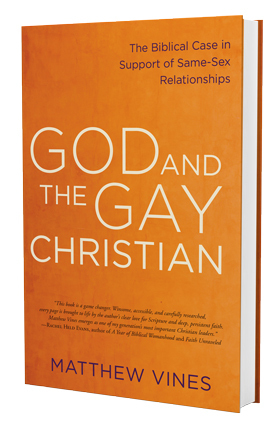
Over the next few weeks, on Wednesdays, we will be discussing Matthew Vines’ book, God and the Gay Christian: The Biblical Case in Support of Same-Sex Relationships. (See Part 1, Part 2, Part 3, Part 4)
I chose this particular book because I think it provides the most accessible and personal introduction to the biblical and historical arguments in support of same-sex relationships, and because Matthew is a theologically conservative Christian who affirms the authority of Scripture and who is also gay. His research is sound and his story compelling, and he’s a friend—someone I like and respect and enjoy learning from.
We will wrap up our discussion next week with a look at Chapters 8, 9 and 10, but today we focus on Matthew’s analysis of 1 Corinthians 6:9-10.
The Kingdom of GodMatthew begins this chapter with a startling and sad confession: “I am far from the only gay Christian who has heard the claim that gay people will not inherit the kingdom of God. That message is plastered on protest signs at gay pride parades. It is shouted by roaming street preachers at busy intersections and on college campuses. The result is that, for many lesbian, gay, bisexual, and transgender people, all they have heard about the kingdom of God is that they won’t be in it.”
That sentence just broke my heart.
The biblical passage typically cited to exclude LGBT people from the kingdom of God is 1 Corinthians 6:9-10, which in the King James version says, “Know ye not that the unrighteous shall not inherit the kingdom of God? Be not deceived: neither fornicators, nor idolaters, nor adulterers, nor effeminate [malakoi], nor abusers of themselves with mankind [arsenokoitai], nor thieves, nor covetous, nor drunkards, nor revilers, nor extortioners shall inherit the kingdom of God.”
Matthew points out that the two terms consider here are malakoi [sometimes translated “effeminate”] and arsenokoitai [sometimes translated “abusers of themselves with mankind” or, more recently, “homosexuals” or “men who practice homosexuality”].
Regarding malakoi, Matthew notes that most uses of the word in ancient literature are not related to same-sex behavior but rather to men who were self-indulgent and enslaved to their passions…for women. In the apostle Paul’s culture, it was believed that women were weak and lacked self-control, so a man who indulged his passions without restraint, or who took on the passive role in any sexual relationship, was considered effeminate. This would explain why many early versions of Scripture translated this word as “wantons,” “debauchers,” “licentious,” and “sensual.” New Testament scholar David Frederickson has argued that, given the context, malakoi in 1 Corinthians 6:9 is best translated, “those who lack self-control.”
The word arsenokoitai is a bit more complicated, and has traditionally been understood to refer to same-sex behavior, especially since a similar word combination occurs in Leviticus 20. In Greek, arsen means “male” and koites means “bed.” While there are very few uses of arsenokoitai in Greek literature after Paul, some of the few uses that have survived indicate it referred to economic exploitation, not same-sex behavior. It’s also important to remember that the most common forms of same-sex behavior in the ancient world were pederasty and sex between masters and slaves. (Pederasty was so common that Philo described it simply as the union of “males with males.”)
Matthew points to an ancient text known as the Sibylline Oracles in which the word arsenokoites is used to describe injustice: “Do not steal seeds. Whoever takes for himself is accursed to generations of generations, to the scattering of life. Do not arsenokoitein, do not betray information, do not murder. Give one who has labored his wage. Do not oppress a poor man.” He also quotes from the second-century text, Acts of John, which says, “And let the murderer know that the punishment he has earned awaits him in double measure after he leaves this world. So also the poisoner, sorcerer, robber, swindler, and arsenokoites, the thief and all his land.” The word also appears in 1 Timothy 1:10 after “sexually immoral” and before “slave traders.”
These and other examples from the ancient world have led several scholars to conclude that the term arsenokoites likely describes economic exploitation by some sexual means.
Given our limited understanding of the exact meaning of these words, it seems like it might be better to err on the side of caution and not rely exclusively on them to condemn or support same-sex relationships. (Personally, I think the Romans 1 passage is probably the most important one to contend with. We covered that in our last discussion.)
“But here’s the key point to remember,” writes Matthew. “Even if Paul had intended his words to be a condemnation of all forms of same-sex relations, the context in which he would have been making that statement would still differ significantly from our context today.”
That’s because same-sex behavior in the first century was not understood to be the expression of an exclusive sexual orientation but rather it was understood as excess on the part of those who could easily be content with heterosexual relationships, but who went beyond them in search of more exotic pleasures. So when the translation of malakoi and arsenokoites shifted in the 20th century to refer to people with same-sex orientation, “it fostered the mistaken belief that Paul was condemning a minority group with a different sexual orientation” when “in fact, he was condemning excessive and exploitive sexual conduct.”
At the end of this chapter, Matthew basically repeats his main thesis:
“The concept of same-sex orientation did not exist in the ancient world. Prior to recent generations, same-sex behavior was widely understood to be the product of sexual excess, not the expression of a sexual orientation. The issue we face today—gay Christians and their committed relationships—has not been an issue for the church in past eras…”
The story of Sodom and Gomorrah is about a threatened gang rape, not an intimate companionship. Leviticus 18:22 and 20:13 were grounded in cultural concerns about patriarchal gender roles and religious ritual purity. Romans 1:26-27 refers to excessive sexual desire and lust and uses “natural” and “unnatural” to refer to customary gender roles, just as those words are used to describe men with long hair and women who cover their heads.
“The bottom line is this,” writes Matthew. “The Bible does not directly address the issue of same-sex orientation—or the expression of that orientation. While its six references to same-sex behavior are negative, the concept of same-sex behavior in the Bible is sexual excess, not sexual orientation. What’s more, the main reason tat non-affirming Christians believe the Bible’s statements should apply to all same-sex relationships—men and women’s anatomical complementarity—is not mentioned in any of the passages.”
Next week we’ll wrap up with a discussion around the biblical arguments for marriage equality.
Questions for Discussion:1. What do you think of Matthew’s treatment of 1 Corinthians 6?
2. If Matthew is right—if committed same-sex relationships are simply never discussed in Scripture—do you find that encouraging or discouraging? Given the degree to which LGBT people have been marginalized, and given the controversy surrounding marriage equality that rages throughout much of the Church, do wish Scripture was a bit more clear on this? Do you think it matters?
Learn more:
If you want to learn more about the Bible and sexuality, check out the Reformation Project conference in Washington D.C., November 6-8. Speakers include David Gushee, Allyson Robinson, Gene Robinson, Justin Lee, Jane Clementi, Danny Cortez, Frank Schaefer, James Brownson, Kathy Baldock, Alexia Salvatierra, and Amy Butler.



Rachel Held Evans's Blog
- Rachel Held Evans's profile
- 1710 followers



